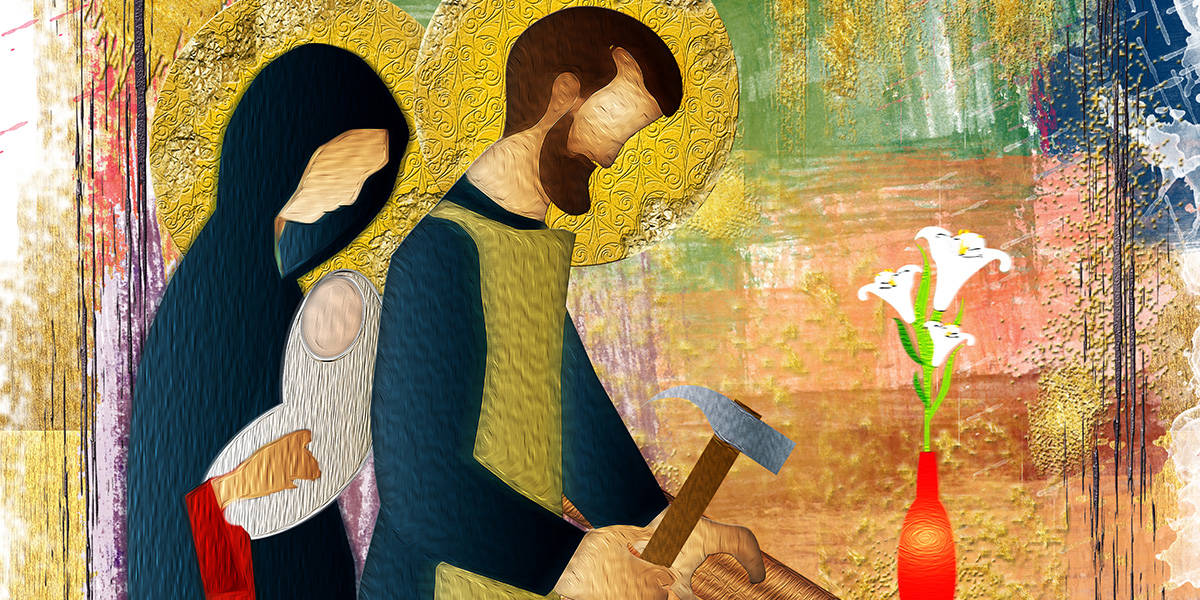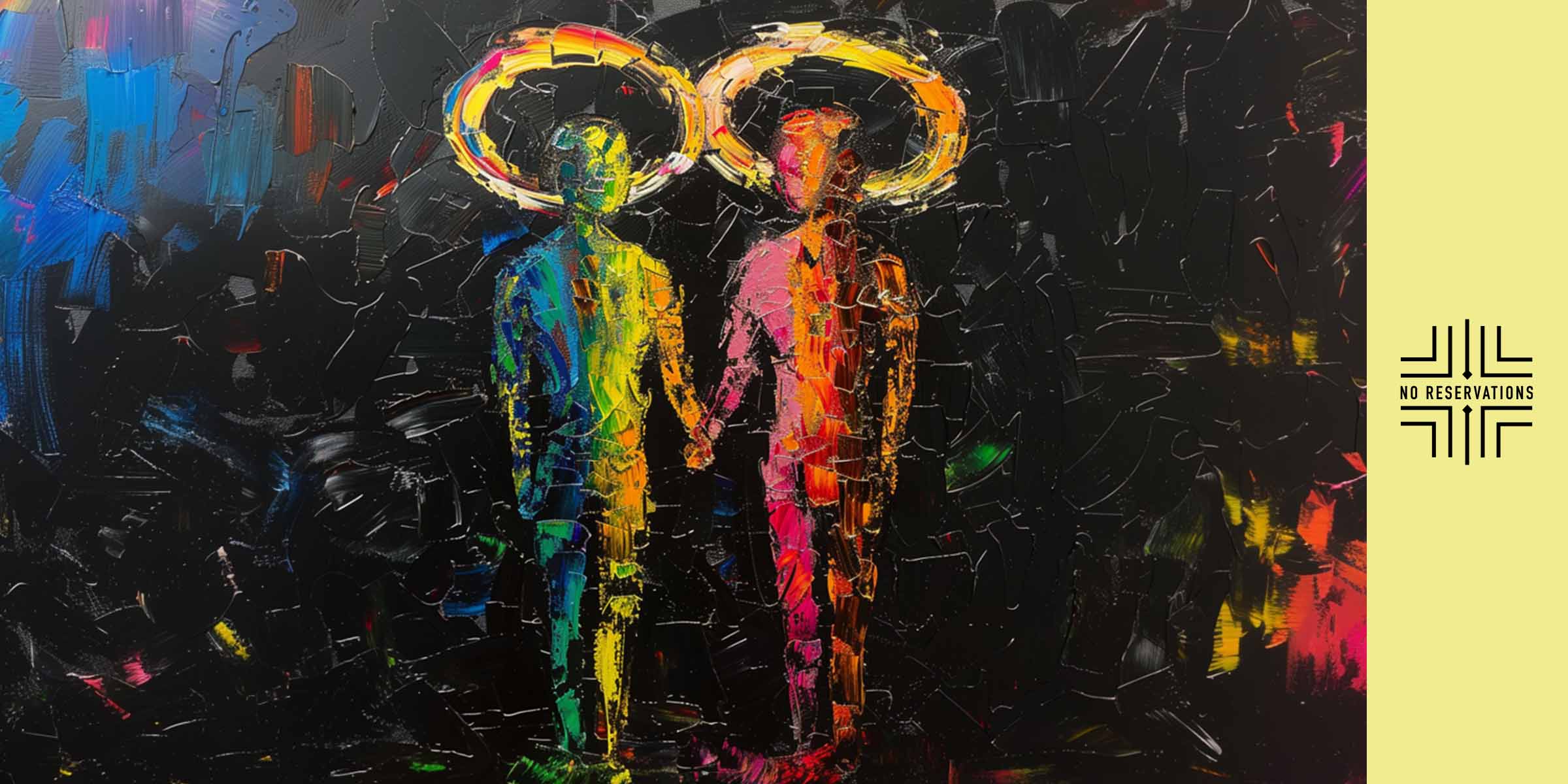A family is made of love.
Scripture: Matthew 1:18-25 (MSG)
The birth of Jesus took place like this. His mother, Mary, was engaged to be married to Joseph. Before they came to the marriage bed, Joseph discovered she was pregnant. (It was by the Holy Spirit, but he didn’t know that.) Joseph, chagrined but noble, determined to take care of things quietly so Mary would not be disgraced. While he was trying to figure a way out, he had a dream. God’s angel spoke in the dream: “Joseph, son of David, don’t hesitate to get married. Mary’s pregnancy is Spirit-conceived. God’s Holy Spirit has made her pregnant. She will bring a son to birth, and when she does, you, Joseph, will name him Jesus—‘God saves’—because he will save his people from their sins.” This would bring the prophet’s embryonic sermon to full term: Watch for this—a young woman will get pregnant and bear a son; they will name him Immanuel (Hebrew for “God is with us”). Then Joseph woke up. He did exactly what God’s angel commanded in the dream: He married Mary. But he did not consummate the marriage until she had the baby. He named the baby Jesus.
All You Need Is Love
What does it mean to be a family? Well, in our society today, the definition of family is wrapped up in those cards from the 1950s where you see a father, mother, and three kids all sitting around the table smiling and having a great time. It seems that even today, the way that family is marketed to the American audience is still very much caught up in that 1950’s look of a happy, white, middle-class family that can magically afford to live in a mid-century colonial revival two-story home in the suburbs of New York with a Mercedes-Benz E class in the garage and if it is a commercial for this time of year, a brand new Lexus SUV with a big red bow parked in the driveway. When we look at the values that we as a society promote in the West, the concept that family comes first is one that is ingrained in our minds which has done a lot to promote social cohesion, but at the same time creates a model for the perfect family that few, if hardly anyone can live up to. For many of us, myself included, get lost in that perfect family that follows the sit-com formula that promises that in a healthy family, there is nothing that can’t be resolved through a good laugh, a hug, and saying the words “I love you.” A formula that adds to the belief that one should do all that they can to protect the family and be willing to always put the needs of the family first. Even if, at times doing so, gets in the way of one’s own happiness or affirmation.
Yet the truth is that the concept of family is one that is not as easy to define, as the modern family in this country continues to change and adapt to meet the needs of our societal pressures and realities. In fact, in this country, the number of families that make up a two-parent household with three or more kids is on the decline, as people are having children as single parents, or are faced with the realities of a life that does not allow them to have kids at the same time as their parents did, or at all because of the rise in infertility. In fact, for my generation, people have kids late into their 20’s and early 30’s, for they are finding it challenging to meet the expectations of the previous generation, which lived in a world much different than the one we have today. It is this reality that has forced my generation and many other people who do not check the boxes of the traditional family checkbox, to start the process of redefining what family means and to begin to move beyond the mentality that it is blood that makes people family. In many ways, the answers to what a family is can be found inside the pages of our sacred scriptures. For in almost every single theological origin story, the conventional wisdom that defines a family in our society, fail to live up to the realities of the stories that we have, that defines a family as anyone who chooses to love, regardless of the consequences of that action.
On this final Sunday of Advent, as we await the coming of Love itself, how can we embrace Joseph, by embracing his choice to see beyond the societal norms of his time, and choose to be a part of both Mary and the baby that was inside her womb?
Joseph’s Magnificat
The story of the birth of Jesus, too many times, focuses solely on the realities of Mary, the birth, and the events that follow. Yet there is one person that is often ignored and can be easily replaceable if broken or lost in most nativity sets, with one of the shepherds who are prostrating to worship the baby Jesus, and that is Joseph. I mean, even in the story of the nativity, Joseph’s role is small when it comes to the overall arc, but in the greater scheme of things, his actions reverberate throughout the entire story of the birth and the life of Jesus. To understand this perspective, I invite you all to use your theological imagination and try to think about how Joseph must have felt when he found out about Mary’s pregnancy. In my imaginative theological narrative, Joseph is a young man who loves Mary so much, as they have been best friends since childhood. Joseph’s father Jacob, a carpenter, had a lot of dealings with Mary’s family as they were neighbors and often shared meals with one another. Joseph grew up knowing that one day, he and Mary would be together and that they would have a big loving family. One where he would teach his firstborn child, all that they needed to know about being a carpenter so that they could have a humble trade to depend on. And then one day, it happened, and Joseph found the perfect moment to ask Mary to marry him, which she happily accepted, for Joseph was a good man, humble and caring. Joseph was ecstatic, and could not wait to start a family with Mary, yet one day, Mary comes to see him at his home with a somber look on her face and tells him that she is pregnant and that the child in her womb is one that will turn the world right-side-up, for, in her heart, she feels connected to the very essence of God. As Joseph listened to Mary, his heartbreaks, and his dreams of having a family begin to fade away and turn into despair. That night, as he was thinking of what to do about Mary, he remembers the very moment when he first saw Mary, back when they were just kids. In that first meeting, Joseph saw Mary glowing with the very essence of joy and love, and it was that glow that made him fall in love with her. This is the place where our scriptures line up with my own theological imagination, as Joseph chooses to love Mary and the son that she is carrying as his own. For the love that he has for her, surpasses that of the expectations and conventions that society had at that time, and it is that love that gives Joseph the courage to become the adopted father of the Great I Am.
Biblical Families
And in a way, Joseph is not alone in defying the norms of what a family should be and look like when it comes to our modern views and understandings. Our sacred stories are filled with family relationships that defy the expectations of not just our own understandings but of the social norms of their own times. In fact, the lineage of Joseph himself in the Bible, is one that is filled with people, both men and women, whose actions are countercultural and serve as social and political commentary to the unexpected nature of the Universe. Characters like Tamar, who pretended to be a prostitute in order so that she may become pregnant by Judah, who thinks that she is cursed after she could not bear any children to both of his older sons and whose fate was to become a begging widow. There is also the story of Rahab, who was a sex worker living in Jericho, who kept hidden the two spies sent by Joshua into the city, ensuring their victory. Rahab gave birth to a son named Boaz, who is the king and gentle-man who took in Ruth, a foreigner, and not only gave her a son but also fully embraced the non-conventional relationship between Ruth and her mother in law Naomi, who raised that son together as a blended family. Ruth is the grandmother of Jesse, who is the father of David. The same David who is loved by God. The same David who loved Jonathan, the son of his enemy, with a love that surpasses one for a woman. The same David who took on the wife of another man, Bathsheba, who gave birth to Solomon. The one who would build the first Temple, and who is credited with the Solomonic Wisdom of our sacred texts. These are stories that serve to show that the lineage of Jesus through Joseph, who would become the Christ, is filled with family members that represent the fullness of the human condition. For Christ’s lineage is not that perfect family representation that we see in our commercials and sitcoms. In fact, it is filled with people who did not let their life circumstances stop them from the joys of a family and choose to love one another beyond the norms of their own time. These stories are our own theological, historical, modern families, where you have people of second marriages, sex workers, foreigners, and even Queer representation that can be interpreted with the story of David and Jonathan and Naomi and Ruth.
Jesus Family is Non-Traditional
To me, it is amazing to hear conservative talking points speaking about the importance of family values and have them point to the Bible as an example to back up their claims. The reality is that what the Bible considers as a family, is anyone that chooses to enter into a contract of love with one another. And that is precisely what Josephs does for Jesus, for in a way, Jesus claims to the royal line of David, is not from blood, but from the fact that he was adopted by Joseph as his own son. And this is what makes the story of Christmas so amazing, even to this day. For here we have a perfect example of a non-traditional family, which serves as the narrative that it is not blood that makes up a family, but it is love and the commitment to be there for one another. Joseph did not have to stay with Mary. He did not have to raise Jesus as his own son. He did not have to become an immigrant by taking them both to Egypt to flee from the dangers of Herod. He did not have to love Jesus as his own and teach him the trade of being a carpenter. No, Joseph chooses to love his chosen family. He chose to honor his commitment to Mary and show her unconditional love, which can be traced to generations before in Joseph’s complicated lineage. Joseph embraced his role and, in doing so, is now remembered and being spoken about two centuries later, across the world, right here in Miami Lakes.
The Ability to Create a New Family
What can we learn from Joseph on this Sunday of Love? Well, the answer to that is simple. When it comes to family, we must remember the words of Jesus when he speaks to his disciples about who his family truly is. And that is all of us here who have chosen to be in community with one another and to love each other through the good and the bad times of our lives. Too many times, our own blood families, fail to fulfill the expectation of unconditional love. Yet, the beautiful thing about Christ’s actions on Earth, is that he taught us that when we follow his Way, we die to the things of this world, and are born anew into the fullness of our humanity. This means that when we begin to let Christ shine from the innermost layers of our soul. As we start that metamorphosis in Christ, we begin to shed away the years of hurt, disappointments, lack of love, and generational trauma that come from our families. For as we, in this last Sunday of advent, embrace the fullness of Love, Peace, Joy, and Hope. We must also embrace forgiveness. And as our own nature continues to transform towards that of Christ, as we wait to celebrate the birth of the One who has shown us the power of our authentic selves. We realize that family is complicated, it is messy, it hurts us, gives us joy, makes us cry, and it is a choice to love unconditionally. So today, I welcome you all to forgive the ones that have hurt you in the past, knowing that at the core of their humanity, they have also been hurt by those that came before them. Creating a vicious cycle of generational pain and trauma, that as the Bible states, visits generation after generation. But if there is anything that we can take away today from the story of Christ’s birth, is that we, like Joseph, can redeem the best parts of our generation, by allowing our actions to love unconditionally the people that we choose to love, break the spokes of the wheels of generation shame, anger, hurt, and traumas.
Choosing to Love like Joseph
So, this Christmas of 2019, as we get ready to put an end to a decade. Let us choose to love like Joseph and create the families of our choice. Families that can include blood relations, but also those whose connections to us are deeper and more profound than blood. And that is the divine connections that we have with one another here today and in the world. So, choose to love another with all of your heart, with all your mind, and with all of your strength. For as the line from the final song in the musical, Les Miserable states, “And remember, the truth that once was spoken, to love another person, is to see the face of God.” So, this Christmas season, let us choose to see the face of God in one another. In our friends, in our families, in our community, and in all of those who we touch with our actions and our deeds. In our lives we have the ability to be like Joseph to those who the Universe places in our path. Therefore, as long as it does not cause you any stress, welcome those people deeper into your lives and choose to make those familial bonds with one another. For the Way of Christ is one that unbends the concept of the traditional family, and encourages us to form the families of our choice, that make us happy, and that will inspire us to reach the fullness of our humanity, and operate as our authentic selves in this world. A world that is so desperately waiting for Love, to continue to change the course of human existence, and to heal the hurt and damage done by our previous generations. Let us join the symphony of God’s hope for all humanity, and be unconventional, like those people in our sacred texts, and take action to put an end to the generational traumas of our past. So that we do not pass that on to those who we choose to love and begin to transform humanity one generation at a time. Creating a new generation that is committed to unconditional love and to the concept of family as a choice. This Christmas season, we choose Love, we choose one another, and we choose to see the face of Christ, the very essence of the One, in the love that we share for one another.
So, say we all. Amen.
By: Harold Marrero
Pastor for No Reservations Group Miami





